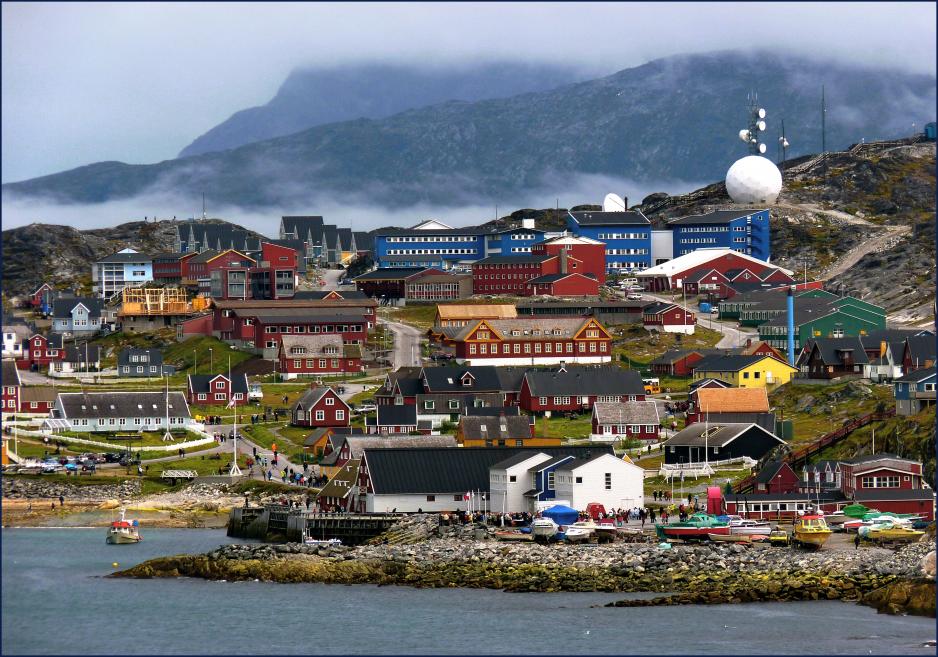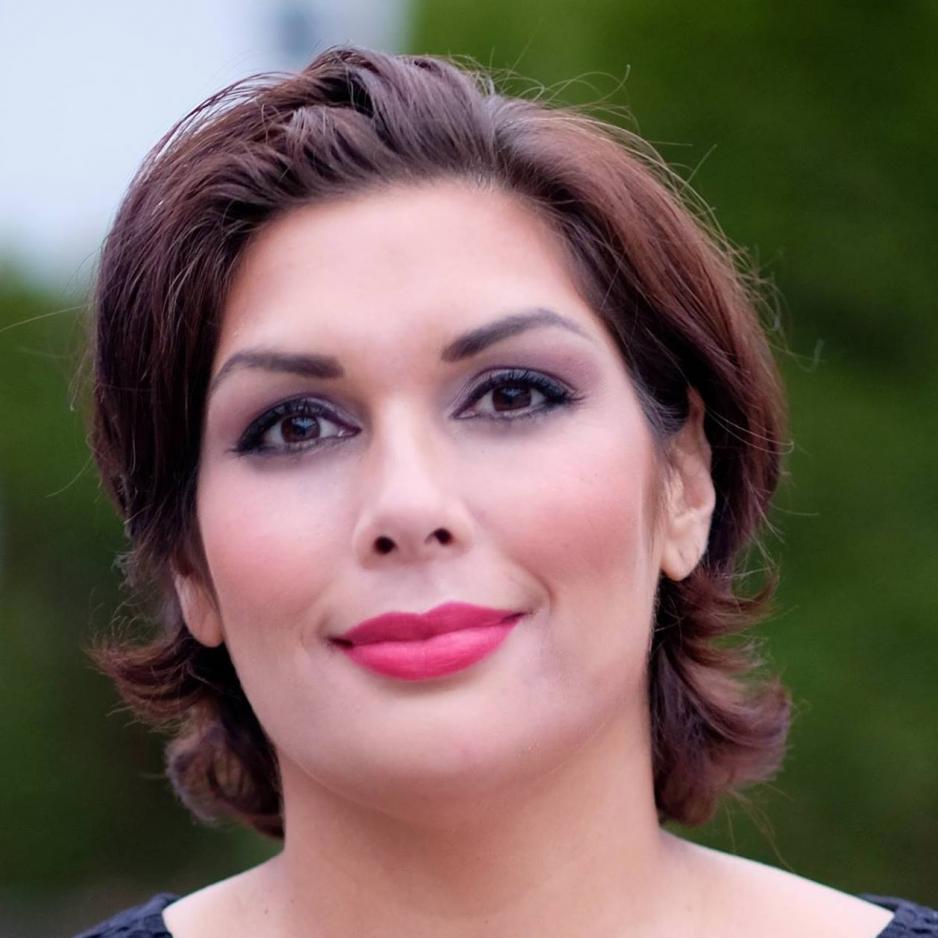Perhaps a Minister of the Arctic is the Way to Go to Make Denmark Embrace Greenland

Nuuk, or Godthåb [Good hope] – which is what the Danes often call the town – is the capital of the self-ruled Danish territory of Greenland. The town lies at the estuary of the Godthåb Fjord on the west coast of Greenland and accommodates a population of 16,000. (Photo: Wikimedia Commons)
Given Greenland’s partial self-rule, it may be right to ask oneself why Denmark has not introduced an Arctic Minister a long time ago, says op-ed writer Melissa Lesamana.
By Melissa Lesamana
In 1972, before the inception of sustainable development and the Brundtland Commission, the world’s first environmental conference took place in Stockholm. From then onwards, 5 June became the world’s Environment Day. Since then, there has been one main message of all the following environmental conferences of the world: The world is facing a major climate threat.
On 5 June this year, there is a general election to parliament, the Folketing, in Denmark.
About the author
Melissa Lesama (40) lives in Kristiansand, Norway.
She holds a MSc in Development Management, having development anthropology and indigenous research as her special area of interest.
She has a background in politics and has also worked in academia as a lecturer as well as in R&D and PhD administration.
At present, Greenland has two representatives from two different parties in the Folketing. Inuit Ataqatigiit, which is left of the Socialdemokratiet [social democrats], has opened up for collaborating both with Lars Løkke Rasmussen’s coalition alternative from the left as well as with the social democrats of Mette Fredriksen. (There are two more northatlantic representatives, but these belong to the Faeroe Islands)
Two seats out of a total of 179 may not amount to much, though who knows what may happen and who will be the deciding votes after the election?
Inuit Ataqatigiit, Greenland’s largest party in the Folketinget, has required the creation of a Minister of the Arctic as its main reward for supporting a coalition.
In more or less all recent articles about the Danish elections, not much attention has been paid to Greenland nor its representatives from Scandinavian media. Even though Greenland holds its self-rule authority, Denmark still runs its foreign and defense politics as well as the area of raw materials.
Furthermore, Greenland is not fully ruling itself as far as the economy goes. With a 40 % block allocation from Denmark to the largest island in the Arctic, the Folketing has said that it will be involved in deciding economic policies. There is pressure on the island to announce new exploration licenses for oil. There is also pressure on expanding its mining industry for extracting minerals such as uranium.
Given the only partial self-rule of Denmark, is it right to ask oneself about why Denmark has not since long introduced an Arctic Minister?
The reason, sadly, is probably the simple fact that Greenland is still considered a colony. In 2014, a reconciliation committee was introduced, and it submitted its report after three years’ work. It concluded that the consequences of the colony era are massive. The victim role and a patronizing view on Greenlanders as being without the ability to take initiative and rule featured prominently in the report.
Former PM Helle Thorning-Schmitt in 2013 said “We have no need of reconciliation, though I fully respect that that is a discussion of concern to the Greenlandic people”.

Melissa Lesama holds a MSc in Development Management, having development anthropology and indigenous research as her special area of interest. She has a background in politics and has also worked in academia as a lecturer as well as in R&D and PhD administration.
At the Inuit Ataqatigiit congress in 2017, several representatives from the Danish Folketing were there to address the congress. One of them told the representatives of their Scandinavian sister parties quietly about how primitive the congress delegates were because they opened the entire event with a traditional ceremony. A lamp of sealskin oil was lit and the national anthem sung before the lamp, which was placed next to a dogsled covered by traditional sealskin suits. The person who made the statement is a representative at the Folketing and speaker for Greenland and the Faroe Islands. Through expressing next to no understanding of the cultural heritage and history that is carried by the indigenous population, as well as for the assimilation politics they were subject to for years and years, such a statement is – at best – completely ignorant; at its worst – fully outrageous.
The major social problems faced by the indigenous people in Greenland are accompanied by well-preserved stereotypes. Several surveys reveal that that many Danes consider the Greenlanders as dependent due to major substance abuse problems as well as other social challenges. This is also looming over the Folketing, which does not want to give Greenland full responsibility over all political sectors and areas.
Greenland is under pressure, both internally as well as from Denmark in a series of areas. What many indigenous communities share, is a holistic way of thinking and stronger bonds to nature. Climate changes have led to the majority of the population still living a sustenance lifestyle to be pushed away from hunting and fishing and more towards urban areas. Unpredictable seasons and snow melting makes hunting more difficult as one can no longer travel with dogsleds and snowmobiles in the same areas as they used to.
In Gretha Thunberg’s era about listening to the voice of children and youth in the climate discussion, Greenlandic youth have also mobilized and spurred on towards climate battle. There have been demonstrations as well as civic law proposals whereby 50,000 people have signed a requirement to introduce ambitions environmental legislation.
Several young under the age of 18 tells of how even they can remember large occurrences of icebergs around Nuuk, icebergs which in comparison are almost absent now. Polar bears draw all the more near to towns, which constitutes a genuine danger to both people as well as the animal itself.
Climate changes and increased temperatures, however, make indigenous people more exposed to social challenges than before. As hunting becomes more difficult, finding a paid job becomes all the more pressing. Icebergs calving more frequently during thaw and then disappearing are observations made by all generations in Greenland.
Climate speaker for the Social Democracy Party, Socialdemokratiet, Jens Joel, has stated that the best thing one can do for Greenland is to say that having control over the climate is as important as controlling the economy, though western cultures have not demonstrated in any way since 1972 that they are capable of this, which science proves that they will need to manage.
Greenland holds a special position when it comes to climate changes, which loom even more grimly over the inhabitants living primarily off hunting and fishing. A greater understanding of indigenous people’s values, traditions, mindset and challenges must be an absolute priority in the Folketing following the elections.
An Arctic Minister may be the way ahead to make Denmark embrace Greenland to a higher extent and in keeping with wants and needs as seen by the Greenlanders, and climate changes are strictly speaking more their area of expertise than the Danes’.
This op-ed was originally published in Norwegian and has been translated by HNN's Elisabeth Bergquist.
